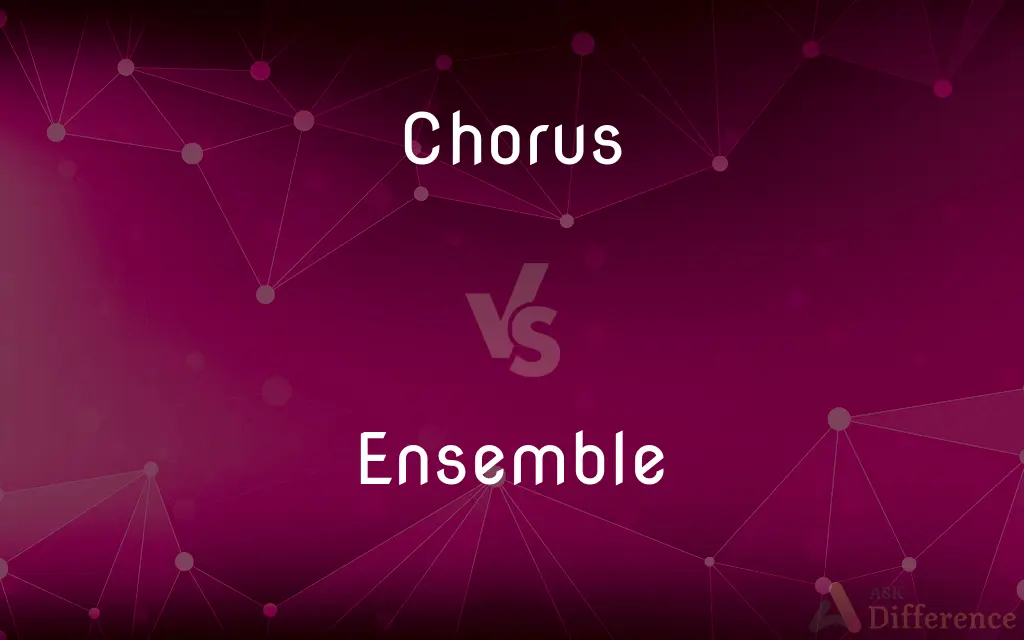Chorus vs. Ensemble — What's the Difference?
Edited by Tayyaba Rehman — By Maham Liaqat — Updated on March 24, 2024
A chorus typically refers to a group of singers performing together, often in a background or supportive role, while an ensemble indicates a group of performers, instrumental or vocal, working cooperatively as equals.

Difference Between Chorus and Ensemble
Table of Contents
ADVERTISEMENT
Key Differences
A chorus is often associated with larger groups in musical theatre, opera, or choral works, providing vocal power and harmony to support the main performers or narrative. They usually perform collectively, sometimes acting as a single entity to enhance the overall sound or atmosphere of a piece. In contrast, an ensemble consists of a smaller group of musicians or performers who may play instruments or sing, focusing on a more integrated and collaborative performance where each member's contribution is distinct yet harmonious.
The role of a chorus is primarily to supplement the lead or principal performers, adding depth and volume to the musical narrative. They can embody various characters or moods, serving as a unified voice or background texture. Whereas, an ensemble acts as a cohesive unit with each member often having individual parts that interlock to create a unified performance, highlighting the collaborative artistry and often featuring more intimate settings or complex interactions among members.
In choral music, the term "chorus" can refer to the entire choir or a specific section within a larger work, emphasizing collective singing. The ensemble concept, however, transcends specific genres, encompassing groups like string quartets, jazz bands, or vocal quartets, where the interplay and balance between members are paramount, allowing for more personal expression within the group dynamic.
While a chorus in a musical theatre or opera setting might serve to move the story along, provide commentary, or enhance the emotional landscape through a unified vocal presence, ensembles perform pieces that require tight coordination and often equal technical skill from all members, whether in chamber music, jazz, or vocal harmonies.
Comparison Chart
Composition
Large group of singers
Small group of instrumental and/or vocal performers
ADVERTISEMENT
Role
Background support, enhancing main performances
Cooperative performance with equal contributions
Performance
Collective, often uniform
Distinct parts, collaborative
Focus
Volume, harmony, atmosphere
Interaction, balance, individual expression
Typical Settings
Operas, musicals, choral works
Chamber music, jazz bands, vocal groups
Compare with Definitions
Chorus
Provides harmonious support in musical compositions.
The chorus sang the refrain with powerful harmony.
Ensemble
A group of musicians or singers performing collaboratively.
The string ensemble's performance was breathtaking.
Chorus
Can act as a narrative force in musical theatre.
The chorus narrated the story's progression through song.
Ensemble
Members have distinct, yet harmonious parts.
Each member of the vocal ensemble had a solo piece.
Chorus
A large group of singers performing together.
The opera's chorus provided a stunning backdrop to the solo arias.
Ensemble
Emphasizes balance and interaction among performers.
The jazz ensemble showcased incredible improvisational interplay.
Chorus
Enhances the emotional and sonic landscape.
The chorus added depth to the emotional climax of the piece.
Ensemble
Can include a variety of instrumental or vocal combinations.
The wind ensemble adapted classical pieces brilliantly.
Chorus
Sings collectively, often blending many voices into one.
The chorus's unified voice echoed majestically in the hall.
Ensemble
Focuses on the collective artistry of its members.
The ensemble's rendition brought a new perspective to the work.
Chorus
A part of a song which is repeated after each verse
Strong guitar-driven songs with big, big choruses
Ensemble
A coordinated outfit or costume.
Chorus
A large organized group of singers, especially one which performs with an orchestra or opera company
He has words of praise for the RSNO Chorus
Ensemble
A coordinated set of furniture.
Chorus
A simultaneous utterance of something by many people
‘Good morning,’ we replied in chorus
A growing chorus of complaint
Ensemble
A group of musicians, singers, dancers, or actors who perform together
An improvisational theater ensemble.
A woodwind ensemble.
Chorus
(in ancient Greek tragedy) a group of performers who comment together on the main action
Sophocles no longer gave the chorus the major role
Ensemble
A work for two or more vocalists or instrumentalists.
Chorus
A device used with an amplified musical instrument to give the impression that more than one instrument is being played
A chorus pedal
Ensemble
The performance of such a work.
Chorus
(of a group of people) say the same thing at the same time
‘Morning, Sister,’ the nurses chorused
Ensemble
A group of separate things that contribute to a coordinated whole.
Chorus
A group of singers who perform together, usually singing multi-part compositions with more than one singer for each part.
Ensemble
(fashion) A coordinated costume or outfit; a suit.
Chorus
A group of vocalists and dancers who support the soloists and leading performers in operas, musical comedies, and revues.
Ensemble
(collective) A group of musicians, dancers, actors, etc who perform together; e.g. the chorus of a ballet company.
Chorus
A musical composition usually in four or more parts written for a large number of singers.
Ensemble
(music) A piece for several instrumentalists or vocalists.
Chorus
A refrain in a song, especially one in which the soloist is joined by other performers or audience members.
Ensemble
A probability distribution for the state of the system.
Chorus
A solo section based on the main melody of a popular song and played by a member of the group.
Ensemble
(machine learning) A supervised learning algorithm combining multiple hypotheses.
Chorus
A group of persons who speak or sing in unison a given part or composition in drama or poetry recitation.
Ensemble
To put together in a coordinated whole.
Chorus
An actor in Elizabethan drama who recites the prologue and epilogue to a play and sometimes comments on the action.
Ensemble
(music) To perform in a musical ensemble.
Chorus
A group in a classical Greek drama whose songs and dances present an exposition of or, in later tradition, a disengaged commentary on the action.
Ensemble
The whole; all the parts taken together.
Chorus
The portion of a classical Greek drama consisting of choric dance and song.
Ensemble
All at once; together.
Chorus
A speech, song, or other utterance made in concert by many people.
Ensemble
A group of musicians playing or singing together;
A string ensemble
Chorus
A simultaneous utterance by a number of people
A chorus of jeers from the bystanders.
Ensemble
A cast other than the principles
Chorus
A simultaneous production of sound by numerous animals
The midday chorus of cicadas.
Ensemble
The chorus of a ballet company
Chorus
A simultaneous production of sound by numerous inanimate objects
A chorus of lawnmowers from the neighborhood's backyards.
Ensemble
An assemblage of parts or details (as in a work of art) considered as forming a whole
Chorus
To sing or utter in chorus.
Ensemble
A coordinated outfit (set of clothing)
Chorus
A group of singers and dancers in a theatrical performance or religious festival who commented on the main performance in speech or song.
Chorus
A song performed by the singers of such a group.
Chorus
An actor who reads the prologue and epilogue of a play, and sometimes also acts as a commentator or narrator; also, a portion of a play read by this actor.
Chorus
A group of singers performing together; a choir; specifically, such a group singing together in a musical, an opera, etc., as distinct from the soloists; an ensemble.
The performance of the chorus was awe-inspiring and exhilarating.
Chorus
(by extension) A group of people in a performance who recite together.
Chorus
An instance of singing by a group of people.
Chorus
(figuratively)
Chorus
A group of people or animals who make sounds together.
A chorus of crickets
A chorus of whiners
Chorus
The noise or sound made by such a group.
A chorus of shouts and catcalls
Chorus
(music)
Chorus
A piece of music, especially one in a larger work such as an opera, written to be sung by a choir in parts (for example, by sopranos, altos, tenors, and basses).
Chorus
A part of a song which is repeated between verses; a refrain.
The catchiest part of most songs is the chorus.
Chorus
The main part of a pop song played after the introduction.
Chorus
A group of organ pipes or organ stops intended to be played simultaneously; a compound stop; also, the sound made by such pipes or stops.
Chorus
A feature or setting in electronic music that makes one instrument sound like many.
Chorus
(Christianity) A simple, often repetitive, song intended to be sung in a group during informal worship.
Chorus
(jazz) The improvised solo section in a small group performance.
Chorus
(transitive)
Chorus
To sing (a song), express (a sentiment), or recite or say (words) in chorus.
Chorus
To express concurrence with (something said by another person); to echo.
Chorus
(rare) To provide (a song) with a chorus or refrain.
Chorus
(intransitive)
Chorus
To sing the chorus or refrain of a song.
Chorus
To sing, express, or say in, or as if in, unison.
Chorus
To echo in unison another person's words.
Chorus
Of animals: to make cries or sounds together.
Chorus
A band of singers and dancers.
The Grecian tragedy was at first nothing but a chorus of singers.
Chorus
A company of persons supposed to behold what passed in the acts of a tragedy, and to sing the sentiments which the events suggested in couplets or verses between the acts; also, that which was thus sung by the chorus.
What the lofty, grave tragedians taughtIn chorus or iambic.
Chorus
An interpreter in a dumb show or play.
Chorus
A company of singers singing in concert.
Chorus
A composition of two or more parts, each of which is intended to be sung by a number of voices.
Chorus
Parts of a song or hymn recurring at intervals, as at the end of stanzas; also, a company of singers who join with the singer or choir in singer or choir in singing such parts.
Chorus
The simultaneous of a company in any noisy demonstration; as, a Chorus of shouts and catcalls.
Chorus
To sing in chorus; to exclaim simultaneously.
Chorus
Any utterance produced simultaneously by a group;
A chorus of boos
Chorus
A group of people assembled to sing together
Chorus
The part of a song where a soloist is joined by a group of singers
Chorus
A body of dancers or singers who perform together
Chorus
A company of actors who comment (by speaking or singing in unison) on the action in a classical Greek play
Chorus
Utter in unison;
`yes,' the children chorused
Chorus
Sing in a choir
Common Curiosities
What defines a chorus in music?
A chorus refers to a large group of singers performing together, often providing background support or harmony.
How does a chorus differ from an ensemble in performance?
A chorus performs collectively, often blending voices to support the main performers, while an ensemble involves more individual parts working together as equals.
Can a musical group be both a chorus and an ensemble?
While they serve different roles, some groups might function as both, depending on the context and repertoire they are performing.
What is the importance of a chorus in an opera?
In opera, the chorus adds depth, emotional resonance, and narrative context, complementing the lead performances.
Are all choruses large and all ensembles small?
Generally, choruses are larger than ensembles, but there are exceptions, especially in smaller or more intimate performance contexts.
How do ensembles enhance a musical performance?
Ensembles enhance music through tight coordination, balance, and the nuanced interplay of individual members' contributions.
Do members of an ensemble have equal importance?
Yes, in an ensemble, each member's part is crucial to the overall performance, often highlighting individual skills within a collaborative framework.
What is an ensemble?
An ensemble is a group of performers, instrumental or vocal, who collaborate closely, with each member contributing distinct yet harmonious parts.
How do performers decide to join a chorus or an ensemble?
The decision might depend on the performer's interests, skills, and the type of music they wish to explore, whether they prefer the collective power of a chorus or the intimate collaboration of an ensemble.
What challenges do choruses and ensembles face?
Both face challenges in achieving a cohesive sound, but while choruses must blend many voices into a unified force, ensembles work on balancing distinct parts to ensure each member shines without overpowering the others.
Share Your Discovery

Previous Comparison
Rabbet vs. Rebate
Next Comparison
Hawk vs. OspreyAuthor Spotlight
Written by
Maham LiaqatEdited by
Tayyaba RehmanTayyaba Rehman is a distinguished writer, currently serving as a primary contributor to askdifference.com. As a researcher in semantics and etymology, Tayyaba's passion for the complexity of languages and their distinctions has found a perfect home on the platform. Tayyaba delves into the intricacies of language, distinguishing between commonly confused words and phrases, thereby providing clarity for readers worldwide.















































